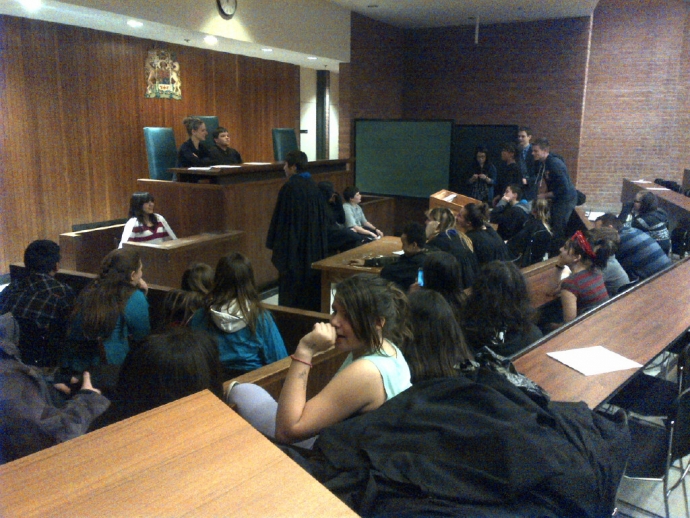HIgh school students participate in a mock trial as part of the 2013 Justice Conference for Aboriginal Youth
By Lisa Del Col
The fifth annual Justice Conference for Aboriginal Youth was held March 22 and drew a record crowd of 45 students from across the GTA and from as far away as Orillia, Ontario. Hosted jointly by the Faculty of Law’s Aboriginal Law Program and the Law in Action Within Schools (LAWS) Program, the conference provides Aboriginal youth with positive exposure to post-secondary education while engaging them in sessions about the legal system, justice sector careers, and university student life.
The conference historically focuses on high-school aged youth but this year the outreach program included youth in grades 7 and 8 from the Canadian Lawyers Abroad’s Dare to Dream Program. Students from First Nations School in Toronto and Mnjikaning Kendaaswin Elementary and Secondary schools from the Chippewas of Rama First Nation were invited to attend. Two streams of programming were created to appeal to the different age groups of the attendees.
Elder Cat Criger from the University of Toronto opened the event with a smudge and words of encouragement for students to walk a good path and contribute their gifts to the betterment of their communities, and the Morning Butterfly Singers got the day off to an inspired start with a welcome song.
Delia Opekekew, a former residential school student and the first Aboriginal woman to be called to the bars of Ontario and Saskatchewan, was the keynote speaker. She shared the story of her educational path. She advised students to overcome barriers to attain their dreams.
The students then split into two streams, where the high school students donned robes and acted out a criminal mock trial, followed by a discussion on restorative justice and a mock sentencing circle with volunteer lawyers Katherine Hensel and Christa Big Canoe. The elementary students learned about Wampum and Treaties from lawyer Paul Williams, and then were engaged in the creative Wizard of Oz themed mock trial, where Dorothy was accused of killing the Wicked Witch of the West with a pail of water (Dorothy was found not guilty by a trial of her peers).
The final session for all students was a career carousel featuring professionals of Aboriginal descent who hold various justice sector roles. Each professional addressed a rotation of the students in small groups, describing their roles and the educational journeys they took to get there.
Career panellists included Gillian Paul, articling student at Olthius Kleer Townshend, Marisha Roman, Aboriginal initiatives counsel at the Law Society of Upper Canada, Segwan Spence, special constable with the City of Barrie Police, Katherine Hensel, partner at Hensel Barristers, and Ajay Winterburn, counsel at the Ministry of Aboriginal Affairs. The students approached all sessions with great enthusiasm and energy, and left the Faculty with many lessons learned.
The conference’s activities were overseen by Lisa Del Col, the Faculty’s Aboriginal law program coordinator, Danielle Thibodeau and Eleanora Dimitrova, LAWS program coordinators, and Stephanie Nilausen of Pro Bono Students Canada. The conference would not be possible without the dedicated law student volunteers from the Faculty’s Aboriginal Law Students’ Association and their valuable assistance and enthusiasm.

